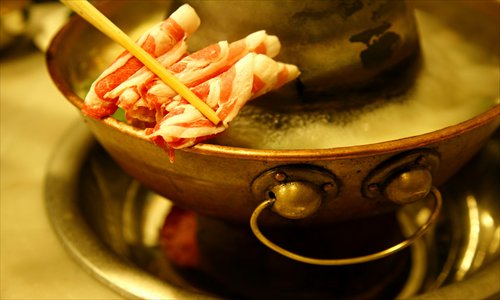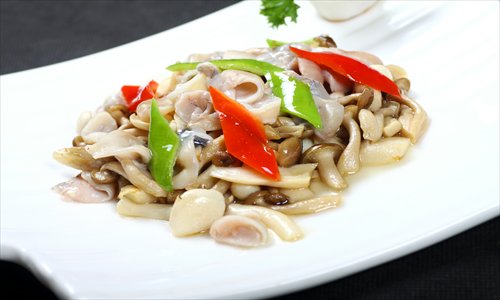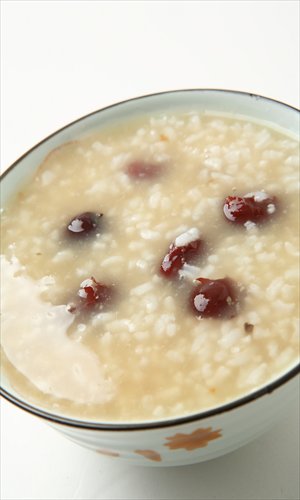What’s in store for winter?
Editor's Note
The ancient Chinese created an agricultural solar system - still in use today - that is based upon their observation of crops, climate, astrology, and the study of animal and plant life cycles. The system guided farmers as to when to sow seeds and when to harvest them, and this system has now been in place for more than 2,000 years.
Today, with advances in science and technology, agriculture depends less on this ancient wisdom. But this seasonal calendar still operates as a reference guide for gourmands to seek out the best times for seasonal delicacies and for health experts to plan nutritious diets.
In a single year, the system features 24 "solar terms," each lasting one day and occurring every two weeks. Each has its own name and characteristics. The Global Times is presenting a weekly series examining which foods and delicacies are best enjoyed during these periods, as well as tips on preserving general health.
Lidong, which falls on November 7 this year, is the first solar period of winter, and the 19th solar period of the year. In Chinese, the word li is a verb and means to begin or start. Lidong literally means "the start of winter." However, in ancient Chinese, the word dong referred not only to winter but also to the "collecting" and "storing," which happened during this period after the harvesting work of agricultural crops was finished. It also refers to finding suitable "storage" for animals and keeping them warm and safe during the winter.
And as for animals, so too for humans; the most pressing health concern in winter is how to protect the body against cold.
Eating well
According to the beliefs of Traditional Chinese Medicine (TCM), the general principle is to increase the quantity of internal heat in your body and to reduce the amount of heat that leaves your body.
With that in mind, adjusting your diet is an important step. The Global Times interviewed Cai Jun, director of the nutrition division at Shanghai Longhua Hospital affiliated to Shanghai University of TCM to guide us through eating well and staying healthy during lidong.
Cai said that, during this period, many people increase their consumption of high-calorie "hot" food such as beef and mutton, especially in hot pots with red meats and which protect against the cold.
"However, this doesn't mean you should eat as much as you like," said Cai. "The consumption of red meat should be strictly controlled according to a person's physical condition."
Cai pointed out that people who suffer from a lack of yin elements in their body should not eat beef and mutton in large quantities, even in winter. He explained further that this description refers to people who easily get a parched mouth, dry tongue and tinnitus and who may also suffer from teeth cavities, inflammation of the gums and acute sore throats.
"If such people eat a lot of beef and mutton, the yang elements in their bodies can become overpowering and have an unbalancing effect on the body which can make the symptoms even worse," said Cai.
According to TCM, there are several warnings when it comes to eating mutton. One is to try to avoid drinking tea while you are consuming this meat, because the leaves contain a high amount of tannic acids. And while you are eating mutton, your body will simultaneously generate tannic acid proteins which can impair bowel movements and cause constipation. The other instruction is not to eat watermelon with mutton. According to TCM, watermelon is "cold," and if you eat too much, it will reduce the ability of mutton to be able to heat and nourish the body.

Heat and nourishment
Cai emphasized that, "while people naturally increase their consumption of high-calorie foods after entering lidong, many people fail to make sure they get sufficient vitamins in the form of fresh vegetables. These foods can help maintain moisture in the body which is important because the weather in winter is usually very dry and this affects the delicate balance of yin and yang in the body."
Cai said that dark-colored non-meat foods in season, for example, various kinds of mushrooms, black sesame seeds and black soy beans are particularly beneficial. Cai has recommended three simple recipes for Global Times readers.

Sautéed mushrooms
Ingredients (for one to two servings): 80 grams of any two kinds of edible mushrooms such as button, coprinus or balone mushrooms, 40 grams carrots, 20 grams cayenne pepper, 10 grams chopped garlic, one half tablespoon salt, two tablespoon rice wine, one tablespoon cooking oil, one half tablespoon sesame oil
Method:
Wash and slice the mushrooms, cayenne pepper and carrots
Add oil to a skillet on a medium heat, and put in the mushrooms, cayenne pepper, carrots and chopped garlic
Sauté for 20 to 30 minutes or until tender
Put onto a plate, and drizzle with a little sesame oil
Spinach with sesame oil
Ingredients (for one to two servings): 250 grams spinach, one tablespoon sesame oil, one half tablespoon salt or sugar
Method:
Wash the spinach and place into a pan of boiling water
Add the salt
Simmer for 3 minutes
Scoop the spinach out and stir the sesame oil inside
According to Cai, the above two recipes can help to alleviate dryness and to relieve coughs during this solar period.

Red dates and glutinous rice porridge
Ingredients (for two to three servings): 70 grams red dates, 100 grams glutinous rice, 100 grams coix seeds
Method:
Soak the red dates, glutinous rice and coix seeds in cold water for about half an hour
Scoop them up and place them into a pan of boiling water
Stir to avoid the rice sticking to the bottom of the pan
Boil and simmer for about 30 minutes
Seasonings such as sugar or salt can be added according to taste
This recipe acts as a tonic for the spleen and helps nourish the stomach. It is especially beneficial for pregnant woman during winter.